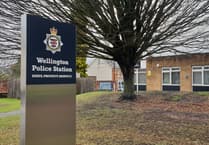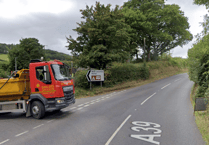MORE than 50 native trees have been planted on a Brendon Hills farm as part of the Woodland Trust’s ‘Big Climate Fightback’ campaign.
It was the first volunteering project for rare breed poultry and superfoods farmers Steven and Stacey Marsh, who only started their Little Acres Farm, near Raleghs Cross, a year ago.
They invited students from the Aurora Foxes Academy, in Minehead, to help plant 52 trees to support local wildlife and combat climate change.
The trees were planted sporadically in the farm’s dedicated wildlife area rather than in regimented rows to create a more natural wooded environment.
Each of the students was presented with a certificate to commemorate the event and were invited to return in a year’s time to see how the trees are growing.
Steven and Stacey asked Foxes to be involved because they have two children with ADHD and autism and appreciated how happy children were being outdoors so believed it would be a project the academy students would also enjoy.
Stacey said: “We know the importance of being outdoors and how teaching others to care for the planet is important, and we wanted to share this experience with the rest of the local community.
“Everybody, including the staff, had such a wonderful time and really got involved, and in a few hours managed to plant a whopping 52 trees.
“We really want to say thank you to Foxes for all their hard work, they did an amazing job.”
The Woodland Trust provided a pack of native trees called ’Wild Harvest’ containing hazel, blackthorn, crab apple, elder, dog rose and rowan, which was chosen to help create food and shelter for local wildlife.
Steven and Stacey are planning more projects and have been in touch with a number of local community organisations which want to help with installing bird boxes, hedgehog houses, hibernaculum, bug hotels and a wildlife pond, among other ideas.
Any groups or families wanting to be involved in future projects can contact Steve or Stacey via the Little Acres website or Facebook page.
The couple only started out last year with their off-grid, family-run farm, utilising the natural world around them to harvest the electricity and rain water used to power the enterprise.
It stemmed from the effects of the Covid-19 lockdown in 2020 when Stacey, a forest school leader and childminder, and Steve, who had just started a laser-cutting business after 18 years as an aircraft engineer, both lost their businesses.
Stacey said: “We bought a piece of agricultural land and decided we would follow in the footsteps of Steve’s grandparents raising poultry.
“During lockdown, with the lack of food that was available in the shops from panic buys, and realising how much as a country we relied upon imported food, it scared us to think that this could be an ongoing problem into our children’s future.
“So, this inspired us to also include selling fruit and vegetables to local businesses, and being conscious as to how this would impact on the environment, Steve put together an aeroponic growing system using recycled water to save 90 per cent of the water usual agricultural growing practices would use, as well as being free from harmful chemicals.
“We know farming can have quite an impact on the environment and we wanted to be in harmony with nature, so we are completely off-grid living, collecting rainwater and using solar power alone to run the farm.
“We plan to be semi self-sufficient, which will mean growing about 75 per cent of the food for consumption and for the poultry feed, making this as carbon neutral as possible.
“This will support the Government target to achieve zero emissions for future farming.”




